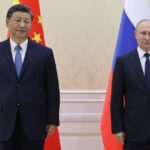
As Ukraine’s two-pronged offensive against the Russians continues, one great imponderable troubles U.S. policymakers. Can Vladimir Putin handle the truth?
Speaking to one senior administration official this week, he wondered aloud whether and how Putin would respond to the massive blows being delivered against his army, especially if the Russians keep losing ground.
Can Putin simply acknowledge what has happened, withdraw, and turn the page? Will he identify and possibly eliminate scapegoats—such as Russian Minister of Defense Sergei Shoigu and some generals? Will he lash out and lay waste to whatever parts of Ukraine he can strike? Or will he use tactical nuclear weapons?
What Happens to Russia After It Loses?
A related series of questions also are currently being evaluated by Western analysts. And those revolve around how will the three main groups surrounding Putin respond; the people of Russia, the business elites, and the security services.
In the views of one official with whom I spoke, the X-factor is whether the security services will indefinitely tolerate the damage Putin’s catastrophic blunder in Ukraine is doing to Russia. “The people are likely to tolerate Putin’s failures and the hardships for the country. The business elites are getting restive and may put pressure on him. But how the security services go will determine whether Putin has a future as Russia’s leader or not,” the official said.
All of these questions have been brought to the fore due to the stunning successes Ukraine has achieved both from the outset of the current phase of the conflict in February and, more recently, with their lightning offensives that have resulted in defeat after humiliating, devastating defeat for the Russians.
Russia is, quite simply, losing. And the Russians may keep losing as Ukraine moves toward strategic cities in the north, and then turns its attention south to Kherson, and ultimately to coastal regions.
When asked whether the coming winter will see a significant slowdown in fighting, the official with whom I spoke questioned the whole concept that winter was an impediment to an expanded war that began, as he rightly noted, in mid-winter. When asked whether we will still be discussing the conduct of the war a year from now, he nodded, indicating that the general expectation is that, despite Ukraine’s victories, it will be a difficult and time-consuming prospect to dislodge Russia entirely from Ukraine.
Russian President Vladimir Putin (C) talks to his bodyguard (R) as Defense Minister Sergei Shoigu (L) looks on during the Navy Day Parade on July 31, 2022, in Saint Petersburg, Russia. President Vladimir Putin has arrived to Saint Petersburg to review Main Naval Parade of over 50 military ships on Russia’s Navy Day.
” data-src=”https://s.yimg.com/ny/api/res/1.2/hE7pJMjEdeU_EM3rXDkE7w–/YXBwaWQ9aGlnaGxhbmRlcjt3PTcwNTtoPTU0NQ–/https://s.yimg.com/uu/api/res/1.2/jowG_pWqydw3cWSjfGdTJQ–~B/aD05MDU7dz0xMTcwO2FwcGlkPXl0YWNoeW9u/https://media.zenfs.com/en/thedailybeast.com/8c5b9dc3e4ac485c64298bec2e1d5a9c”><img alt="
Russian President Vladimir Putin (C) talks to his bodyguard (R) as Defense Minister Sergei Shoigu (L) looks on during the Navy Day Parade on July 31, 2022, in Saint Petersburg, Russia. President Vladimir Putin has arrived to Saint Petersburg to review Main Naval Parade of over 50 military ships on Russia’s Navy Day.
” src=”https://s.yimg.com/ny/api/res/1.2/hE7pJMjEdeU_EM3rXDkE7w–/YXBwaWQ9aGlnaGxhbmRlcjt3PTcwNTtoPTU0NQ–/https://s.yimg.com/uu/api/res/1.2/jowG_pWqydw3cWSjfGdTJQ–~B/aD05MDU7dz0xMTcwO2FwcGlkPXl0YWNoeW9u/https://media.zenfs.com/en/thedailybeast.com/8c5b9dc3e4ac485c64298bec2e1d5a9c” class=”caas-img”>
Russian President Vladimir Putin (C) talks to his bodyguard (R) as Defense Minister Sergei Shoigu (L) looks on during the Navy Day Parade on July 31, 2022, in Saint Petersburg, Russia. President Vladimir Putin has arrived to Saint Petersburg to review Main Naval Parade of over 50 military ships on Russia’s Navy Day.
Contributor/Getty Images
Nonetheless, there is a sense of admiration for what the Ukrainians have achieved in the current offensive, just as there is optimism about the future of their operations. They have demonstrated themselves to be superior strategists and fighters to the Russians, having relegated “the world’s second best army” to being the second best (if that) in their own neighborhood.
Officials assured me that the U.S. and the West remain committed to supporting Ukraine, and to providing the assistance needed to capitalize on the recent wave of Ukrainian victories.
Further, U.S. officials believe that while Russia will try to inflict pain on Europe in the form of reducing access to crucial energy supplies this winter, they also believe that Europe is preparing to weather that squeeze. Multiple new supplies of gas are being negotiated and new policies are being implemented, which could bring with them the long-term benefit of ensuring Europe is permanently immune to Russian energy blackmail efforts.
Compounding the challenge for Russia is the recently started war between Azerbaijan and Armenia, a distraction at just the wrong time for Moscow which has pledged in the past to intervene on Armenia’s behalf. Further, while Russia might hope for greater support from China, its most important ally—perhaps coming in the wake of this week’s scheduled meeting between Putin and Chinese President Xi at the “Shanghai Summit” in Uzbekistan—that support is unlikely to come in the form of military assistance.
The Russians and the Chinese have talked a good game of solidarity, but China has been wary of getting too involved in what they see as a mess of Russia’s making in Ukraine and, concerned with economic issues at home, the Chinese government especially does not wish to damage relations with the EU—which would certainly be the case were China to provide weapons to Russia and the West were to respond with sanctions against Beijing.
Mikhail Gorbachev Rode the Wave of History. Putin Is Swimming Against It.
All of this is to say: Putin is in a pickle.
Things have gotten so bad that the significant quantities of abandoned, usable Russian vehicles, weapons, and ammunition left on the battlefield are now being described by the Ukrainians with their characteristic mordant humor as “Russian Lend Lease.”
That’s why the question turns to what Putin and those around him will do in response to defeat after defeat and the harsh reality that victory for Russia is really an impossibility at this point.
U.S. officials said they have directly told the Russians that the use of tactical nuclear weapons would trigger a response that would surely and deeply compound Russia’s pain. That likely does not portend the use of U.S. or Western nuclear weapons. But it could mean providing Ukraine with new weapons systems, perhaps some with the capability of striking into Russia—as well as significantly enhancing aid to Ukraine and dramatically increasing sanctions on Russia.
A soldier, call sign Petrovich, stands in trenches on the Kherson frontline in Mykolaiv region, Ukraine, 8th of August 2022.
” data-src=”https://s.yimg.com/ny/api/res/1.2/MSp2U8VONWA6geYLAnf44g–/YXBwaWQ9aGlnaGxhbmRlcjt3PTcwNTtoPTQ3MA–/https://s.yimg.com/uu/api/res/1.2/Ojs_c.f0xEeMqAk4uz7h3g–~B/aD03ODA7dz0xMTcwO2FwcGlkPXl0YWNoeW9u/https://media.zenfs.com/en/thedailybeast.com/636d6569654a6f78eb186bc471411495″><img alt="
A soldier, call sign Petrovich, stands in trenches on the Kherson frontline in Mykolaiv region, Ukraine, 8th of August 2022.
” src=”https://s.yimg.com/ny/api/res/1.2/MSp2U8VONWA6geYLAnf44g–/YXBwaWQ9aGlnaGxhbmRlcjt3PTcwNTtoPTQ3MA–/https://s.yimg.com/uu/api/res/1.2/Ojs_c.f0xEeMqAk4uz7h3g–~B/aD03ODA7dz0xMTcwO2FwcGlkPXl0YWNoeW9u/https://media.zenfs.com/en/thedailybeast.com/636d6569654a6f78eb186bc471411495″ class=”caas-img”>
A soldier, call sign Petrovich, stands in trenches on the Kherson frontline in Mykolaiv region, Ukraine, 8th of August 2022.
Wojciech Grzedzinski/For The Washington Post via Getty Images
If Putin does not choose that route, then what?
Is the Russian president strong enough at home (and mentally healthy enough) to acknowledge the reality on the ground, offer excuses, declare victory, and fire a few senior military officials? He has never shown such equanimity in the past. If he lashes out, then how badly will he lash out? It is fair to say that Western intelligence assets are heavily devoted to tracking this situation and trying to anticipate and blunt the consequences of whatever the wounded Russian leader does.
A New Iran Nuclear Deal Would Help Prove America Is Truly Back
The difference between great men and pretenders is how they handle defeat. The former recognize defeat is both an inevitable aspect of long-term leadership, and that it offers lessons which they are adaptable enough to apply. The latter group—pretenders, lesser men, and worse—deny defeats, pretend they did not happen or they blame others.
All indicators point to Putin being a bad loser, who will likely make a terrible situation much worse. Hoping for the best has been a losing strategy when dealing with him—which is why, for now, Ukraine, and the West must expect and prepare for the worst.
We must remain committed to enabling Ukraine’s surprising and inspiring armed forces to fight and punish Russia until no one, not even an isolated dictator, surrounded by toadies, can deny the reality of defeat on the ground—or until those around Putin acknowledge the inevitable, by putting a stop to his reign of brutality before all of Russia suffers even more greatly the cost of their leader’s obsession, cruelty, and denial.
Get the Daily Beast’s biggest scoops and scandals delivered right to your inbox. Sign up now.
Stay informed and gain unlimited access to the Daily Beast’s unmatched reporting. Subscribe now.




